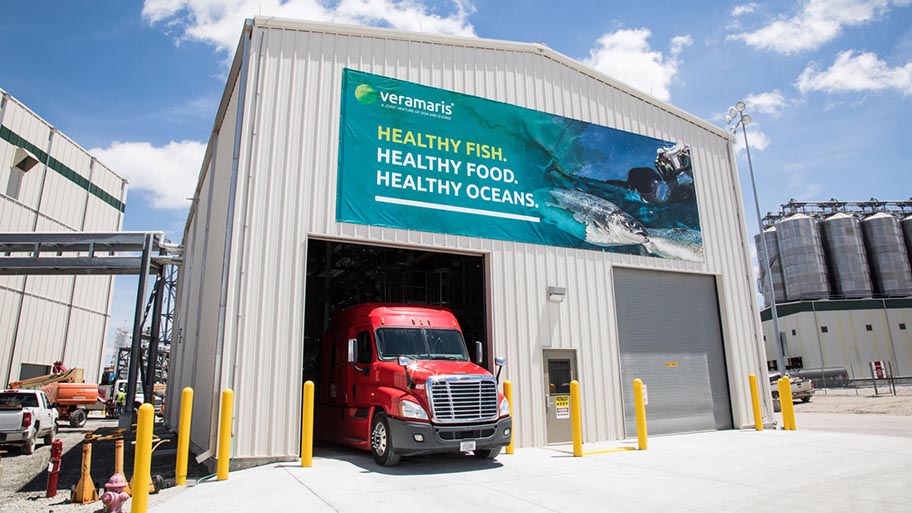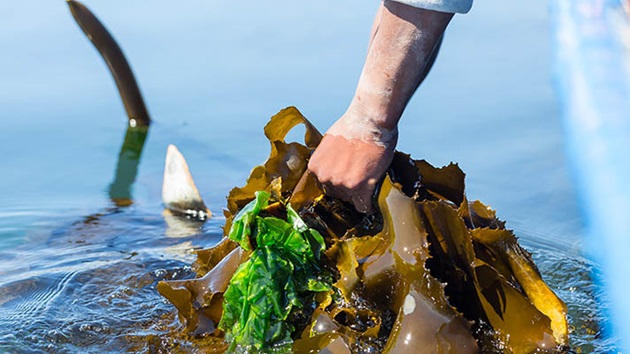Dutch biotechnology company Veramaris has become the first producer of microalgae oil for fish feed to achieve joint Aquaculture Stewardship Council (ASC) and Marine Stewardship Council (MSC) certification for sustainable seaweed production.
 Microalgae-derived Omega-3 production facility in Nebraska, USA © Veramaris
Microalgae-derived Omega-3 production facility in Nebraska, USA © Veramaris
Veramaris produce Omega-3 oil from microalgae at a land-based facility in the United States. Certification to the global ASC-MSC Seaweed Standard confirms that production of microalgae at this facility is environmentally sustainable and socially responsible.
Microalgae are microscopic, plant-like organisms that naturally produce oil rich in Omega-3, an essential fatty acid that can only be obtained through diet. Veramaris’ microalgae-derived oil contains two forms of Omega-3 (EPA & DHA) and is used to supplement fish feed for the aquaculture industry, and pet food.
The majority of Omega-3 oil for fish feed is derived from wild fish stocks. Our oceans are under great pressure to supply fish both for direct human consumption and for feed in the aquaculture industry.
Patricia Bianchi, ASC-MSC Seaweed Account Manager is hopeful: ‘The sustainable and responsible production of Omega-3 from algae will help to relieve some of this pressure on wild stocks and help reduce the risk of overfishing.”
The certified Veramaris microalgae oil can supply 15% of the global Omega-3 requirements for salmon farms, providing the aquaculture industry with a complementary source of sustainable Omega-3 oil.
According to the Food and Agriculture Organization of the United Nations (FAO), farmed fish is essential for meeting the increasing global demand for protein while restoring the health of our oceans. To meet the growing demand for farmed fish and feed sustainably, farms should be well managed and use responsibly sourced feed - a requirement for farms wanting to be certified to the ASC Standard for responsible aquaculture.
The availability of supplementary sustainable sources of Omega-3, such as Veramaris microalgae-derived oil, can help to enable further sustainable growth in the aquaculture industry without increasing pressure on wild fish stocks.
 Aerial view of an aquaculture farm © Veramaris
Aerial view of an aquaculture farm © Veramaris
In 2020, approximately 20% of the fish used to produce fishmeal and fish oil were MSC certified. However, the recent suspension of several small pelagic fisheries in the North East Atlantic has resulted in a significant loss of certified fish available to the industry. The certification of Veramaris’ microalgae-derived oil adds a further 45% to the global supply of MSC certified Omega-3, helping to ensure that fish farmers and other industries can still obtain Omega-3 from a sustainable source.
The certification of Veramaris marks an imperative milestone for the company, who are aiming to expand the world’s access to sustainable EPA & DHA Omega-3.
Karim Kurmaly, Veramaris CEO said: “We are committed to working with partners along the value chain to bring transparent and sustainable solutions to the industry that results in healthy fish, healthy food and healthy oceans for generations to come”.
To achieve ASC-MSC certification, Veramaris was required to demonstrate that it meets the requirements of the Seaweed Standard. The Standard applies to both wild and farmed seaweed operations, recognising sustainable seaweed production and providing a benchmark for improvement.
Veramaris was subject to a rigorous audit process against dozens of requirements for good management practices, carried out by independent third-party certifier SAI Global. The certifier checked records, took measurements, and interviewed operators to assess whether the Veramaris facility met every requirement in the standard. These requirements include responsible energy use, minimal impacts on biodiversity, fair treatment and pay for all staff and involves a public consultation period.


